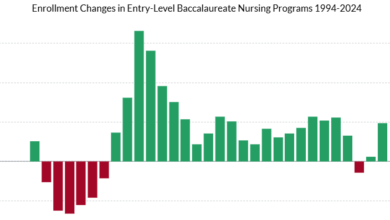Reduced working week for Scotland nurses from April

The Scottish Government has agreed to fully implement recommendations from an Agenda for Change (AfC) review, which will include a reduction to the working week, protected learning time and a review of band 5 nursing roles.
The country’s health secretary, Neil Gray, today gave the green light to the recommendations, with implementation expected as soon as next month.
“I really look forward now to seeing the implementation process through so our members can realise these benefits”
Colin Poolman
The Scottish Government committed to modernising its AfC contract as part of the 2023-24 pay deal, agreed last year.
It was one of several reforms that was proposed to support workforce recruitment and retention in the country.
The AfC review recommendations were first put to the Scottish Government in November last year.
Now, in a letter to trade unions and NHS employers, Mr Gray has confirmed a series of AfC reforms that will be implemented in the coming months.
The first is a 30-minute reduction in the working week, which will be enforced from 1 April.
It is the first phase of a process to cut the working week by 1.5 hours in total.
Any staff who cannot have their working week reduced by 30 minutes, due to service pressures or safe staffing issues, will be paid overtime.
Meanwhile, the Scottish Government has also committed to implementing a process for reviewing band 5 nursing roles, for nurses who think they are working beyond their job description.
Nurses working at a band 5 level will be contacted by their employer and invited to apply for a review of their role.
If they are successful in their application, they will receive backdated pay from when it is agreed they have been working beyond their job description.
The backdated pay will go no further back than 1 April 2023.
Another AfC reform set to be introduced is protected time for statutory, mandatory and profession-specific learning across all NHS Scotland health boards.
The Scottish Government said further details, including implementation guidance on each of these areas, would be issued to the NHS before 1 April 2024.
Mr Gray said: “We expect NHS boards to work in partnership with trade unions and staff to reduce the working week.
“This presents an opportunity to modernise how staff are rostered and work, ensuring that NHS Scotland is a leader in flexible and family friendly working practices.
“I am grateful to both trade union and employer representatives for working in partnership with us to develop these reforms to help modernise our service.”
The Royal College of Nursing in Scotland has welcomed the announcement that the recommendations from the AfC review have finally been accepted.
Colin Poolman, RCN Scotland director, said: “There should be no surprises around these proposals.

Colin Poolman
“These elements of the 2023-24 pay deal were fundamental to resolving the RCN’s dispute on NHS pay in Scotland and to preventing the historic industrial action experience in the other UK nations.”
Mr Poolman noted that the RCN had worked alongside other trade unions and NHS employers to develop implementation plans.
He added: “Valuing and recognising the safety critical role of nursing staff, through fair pay and working conditions, is key to retaining and recruiting the sustainable nursing workforce needed to meet the growing demands on our health and care services.
“I really look forward now to seeing the implementation process through so our members can realise these benefits.
“At the same time, we will continue to press the Scottish Government to open negotiations for the 2024-25 pay award.”





